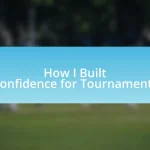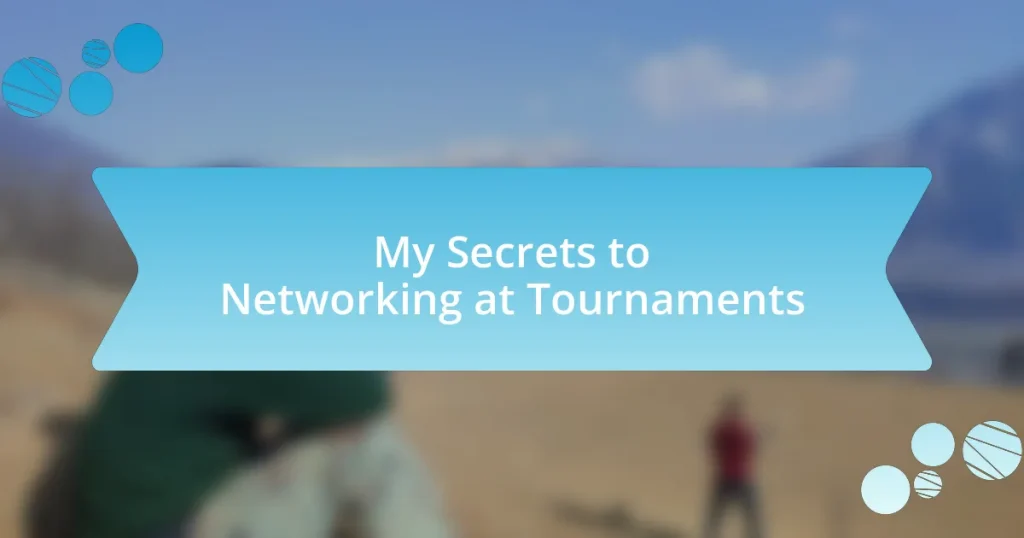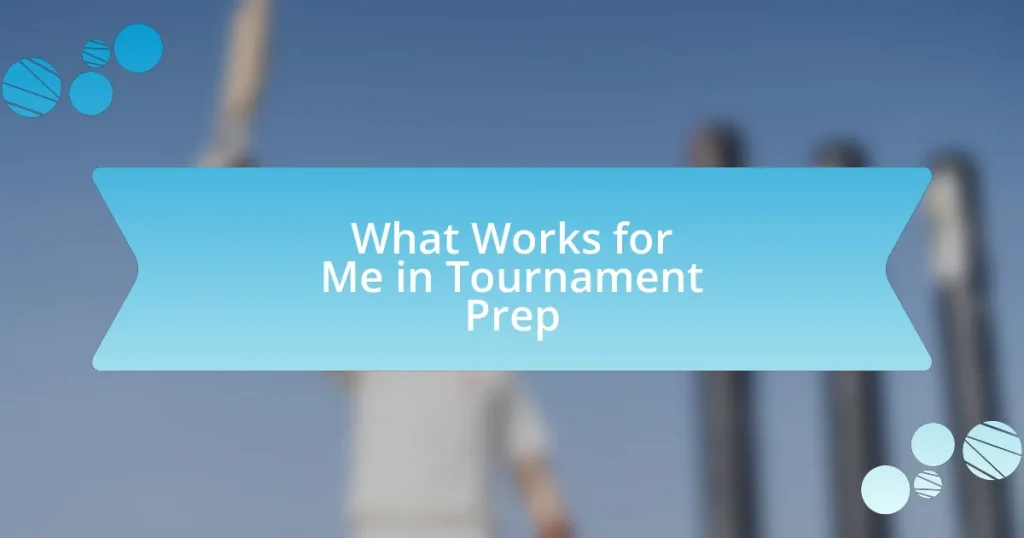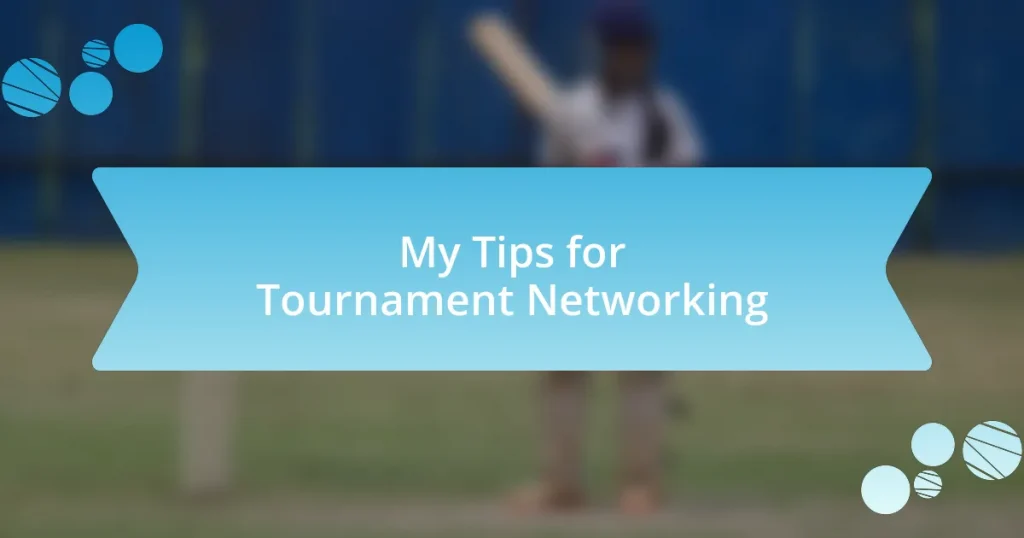Key takeaways:
- Networking is about building meaningful relationships that can lead to opportunities, mentorships, and collaborations.
- Preparation for tournaments should include setting networking goals, researching attendees, and practicing conversational starters.
- Authenticity and consistency in personal branding and social media presence enhance recognition and connection potential.
- Following up after events with personalized communication can reinforce connections and open doors to new opportunities.
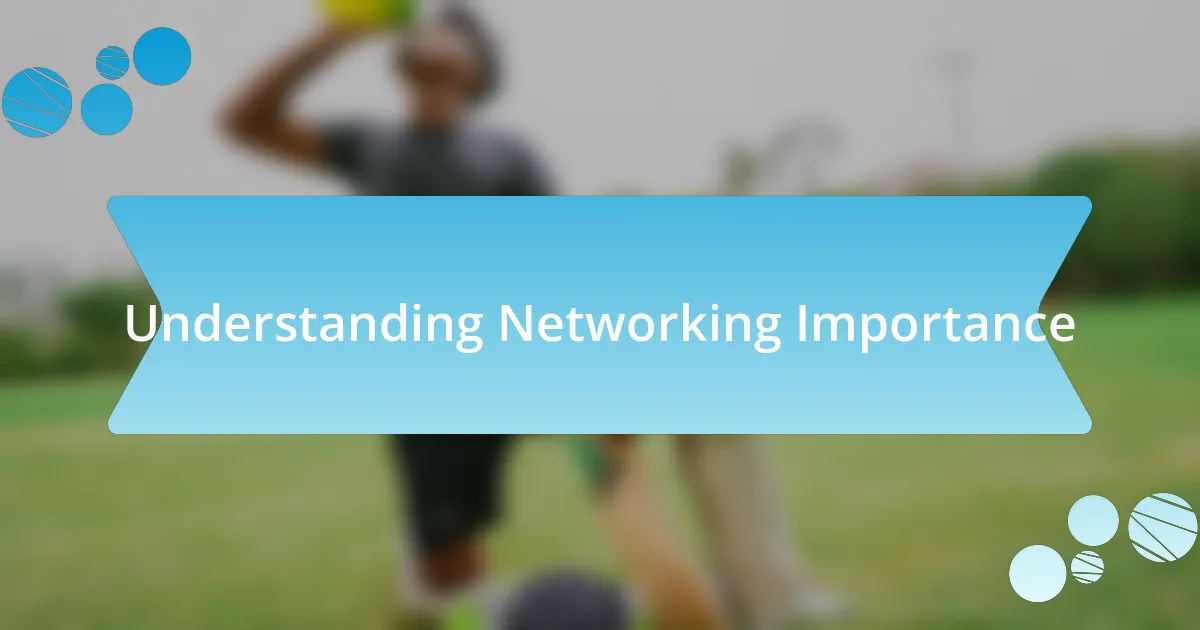
Understanding Networking Importance
Networking isn’t just about collecting business cards; it’s about building relationships that can support you throughout your career. I recall a tournament where I hesitated to approach a seasoned player, fearing rejection. But when I finally did, I found a mentor who became pivotal in my journey, illustrating how one connection can alter your path dramatically.
Think about it: have you ever felt isolated at an event, even in a crowd? That sensation of being alone can be daunting, and it reminds us how vital connections are. During my early days in competitive circles, I learned that engaging with others not only opens doors to opportunities but also fosters a sense of belonging in an otherwise competitive environment.
When I reflect on my own experiences, I realize that the connections I’ve made at tournaments have led to collaborative projects, unexpected job offers, and lifelong friendships. It’s about leveraging those moments when you can share experiences and knowledge with others, creating a network that thrives on mutual support. Don’t underestimate the power of a simple conversation; it could lead to your next great opportunity.
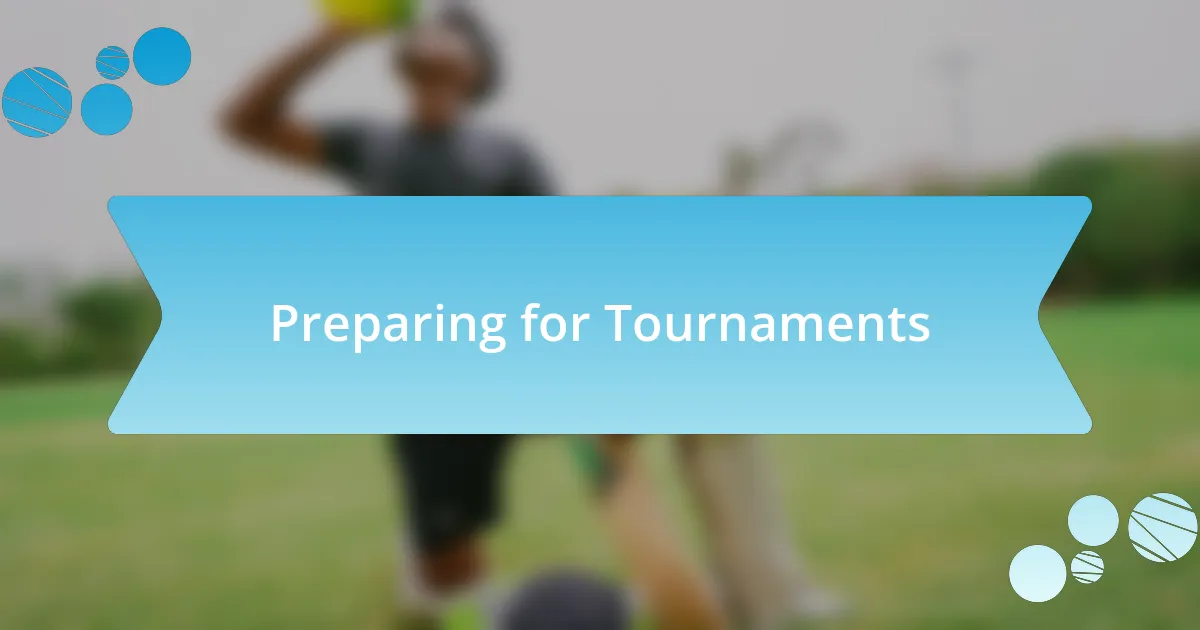
Preparing for Tournaments
When preparing for tournaments, it’s essential to approach it with a strategy that goes beyond just your game plan. I remember a particular tournament where I spent weeks not only honing my skills but also planning my networking strategy. I intentionally researched attendees and formulated a loose schedule to connect with key individuals I admired. This gave me a sense of direction and focus, ensuring I didn’t miss out on valuable opportunities to build relationships.
Here are some key points to consider while preparing for tournaments:
- Research Attendees: Look into who will be there. Knowing their background helps me tailor conversations.
- Set Networking Goals: I often set a personal goal, like connecting with three new people, which keeps the process rewarding.
- Prepare Conversational Starters: I think about engaging questions or comments related to the event that can kick off discussions smoothly.
- Bring Professional Materials: I always carry business cards and a few copies of my portfolio to leave a tangible impression.
- Get in the Right Mindset: I remind myself that everyone is there for similar reasons. This thought calms my nerves and boosts my confidence.
Taking the time to prepare not only enhances my performance during the tournament but also maximizes the potential for fruitful connections.

Building Your Personal Brand
Building your personal brand is a crucial step in effective networking, especially at tournaments. In my experience, presenting a consistent image of who you are and what you stand for significantly influences how others perceive you. During one tournament, I realized the importance of not just showcasing my skills but also embodying my values. I carried myself with confidence and engaged authentically with others, which resonated well and made a lasting impression.
I’ve always found it effective to leverage social media as a platform for my personal brand. Before a tournament, I often share insights, tips, or even highlights from my preparation process. This not only builds anticipation but also creates a sense of familiarity with potential connections. For instance, one time, I tweeted about a particular strategy I was employing, and it led to a meaningful conversation at the event with someone who had similar interests.
Lastly, consistency is key. Your brand should be reflected in every interaction, whether it’s casual conversations or formal discussions. I remember a specific moment when I met someone who had followed my journey online. Their recognition of my past work deepened our conversation, transforming a casual exchange into a valuable connection. This experience underscored the need for me to stay true to my brand, ensuring that every encounter resonates with authenticity.
| Aspect | My Approach |
|---|---|
| Consistency | Ensure all your interactions reflect your core values. |
| Social Media | Engage audiences with valuable insights before the event. |
| Authenticity | Be yourself in conversations, as genuine interactions stand out. |
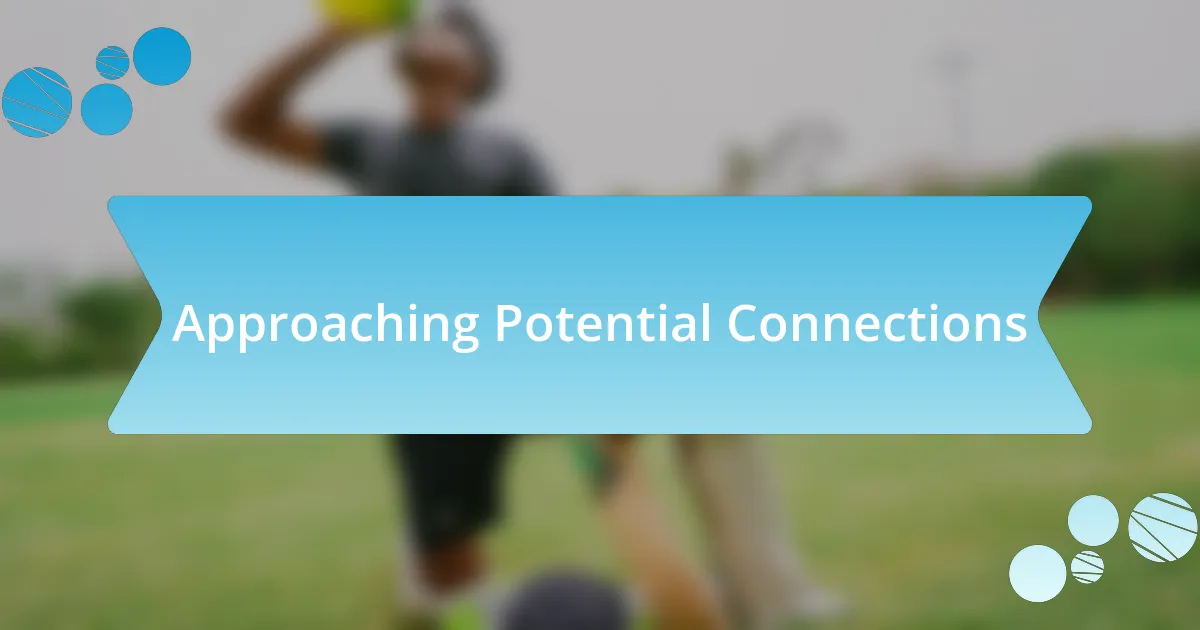
Approaching Potential Connections
Approaching potential connections at tournaments can be a nerve-wracking experience, but I’ve found that a simple smile and open body language can break the ice. I once approached a small group discussing strategies over coffee, and instead of freezing up, I made a casual comment about the weather’s impact on our energy levels that day. This lighthearted opener shifted the focus from a formal interaction to a more relaxed conversation, allowing me to connect with them on a human level.
Another technique I’ve used is asking open-ended questions that encourage others to share their thoughts and experiences. At a recent tournament, I asked a fellow participant what inspired their latest project. Their enthusiasm was contagious, and the discussion naturally led into sharing our personal challenges and triumphs, deepening our connection. I always ask myself, “What’s the story behind their journey?” Exploring that curiosity not only helps me engage but also creates a genuine rapport.
Confidence plays a pivotal role in these encounters, too. I recall a time when my nerves almost got the best of me while waiting to introduce myself to a well-known mentor. After taking a deep breath, I reminded myself of my accomplishments and the value I could bring to the conversation. As I approached them, I felt a shift in my energy; suddenly, it became less about impressing them and more about sharing ideas, which transformed that moment into an invaluable connection.
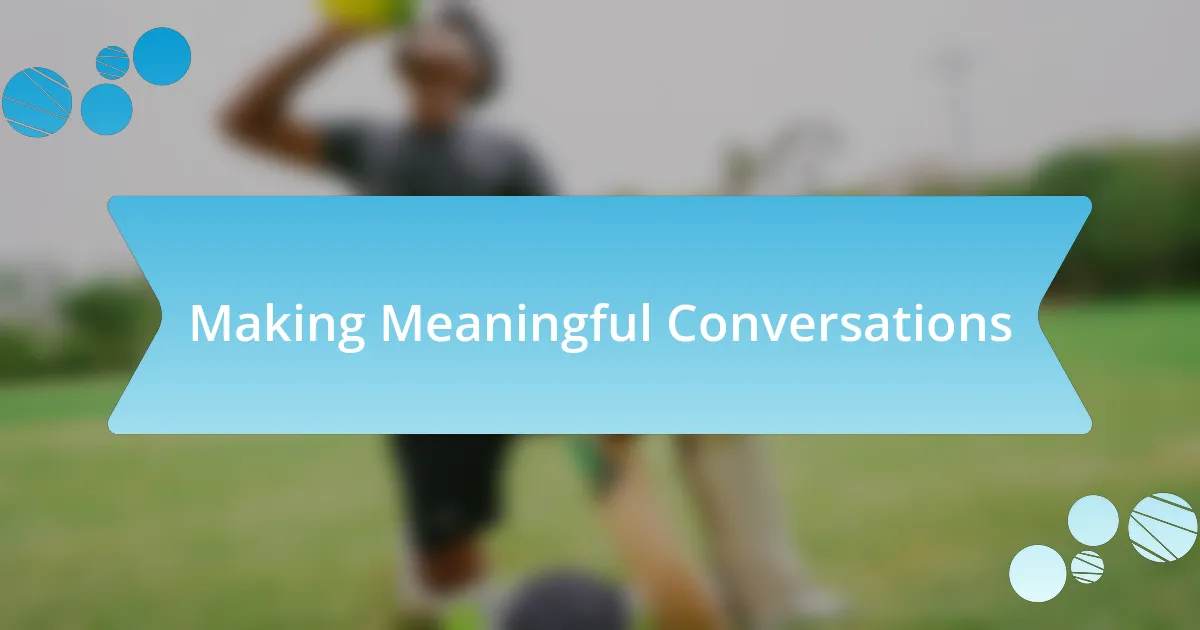
Making Meaningful Conversations
Creating meaningful conversations hinges on finding common ground. I remember chatting with a fellow participant who shared my interest in sustainability. After discovering this shared passion, the conversation flowed effortlessly, revealing not just professional aspirations but also personal values. Have you ever experienced that spark when you realize someone else shares your beliefs? It feels like a natural connection is being forged, reinforcing that networking is as much about personal relationship-building as it is about professional development.
In my experience, storytelling is an excellent way to deepen conversations. The other day, I spoke with someone about their journey through setbacks in their career. As they recounted their struggles, it made me reflect on my own challenges. This exchange not only humanized our professional lives but also created a more intimate atmosphere where we both felt free to be vulnerable. I find that these moments of shared authenticity strengthen connections; it’s like weaving threads of understanding that bind us together.
Listening actively can truly elevate a conversation. When I invested my full attention to another person’s story, echoing their sentiments and showing genuine curiosity, I noticed how it transformed the interaction. I once had a robust discussion with someone who was passionate about game design. Instead of merely waiting for my turn to speak, I probed deeper into their ideas, and the dialogue became not just a back-and-forth but an engaging exploration. Have you ever realized how valuable it is when someone not only hears you but genuinely understands? That’s where meaningful conversations thrive.

Following Up After Events
It’s easy to let connections fade after a tournament, but following up can reignite those initial sparks. I recall sending an email to a contact I met at a recent event, expressing how much I enjoyed our chat about innovative marketing strategies. The response was immediate and enthusiastic, and it led to a fruitful conversation that opened doors I hadn’t anticipated. Have you thought about how a simple follow-up can not only reinforce a connection but also potentially lead to new opportunities?
When I follow up, I try to reference specific points from our previous discussion, which adds a personal touch. For instance, I once mentioned a book recommendation based on a friend’s interest in leadership. That small detail turned our ordinary exchange into an enriching dialogue, as it gave us a platform to discuss our perspectives. It’s fascinating how personal details can inspire continued conversation and build a deeper relationship.
Timing can be everything in networking as well. I remember reaching out to someone a week after we met, which felt just right. Too soon can feel awkward, while waiting too long might let that connection slip away. By following up at the right moment, you show that you value the relationship, making it easier for both sides to engage again. How do you determine the best time to follow up? I find that trusting my instincts, combined with a sense of urgency, often leads to the best outcomes.
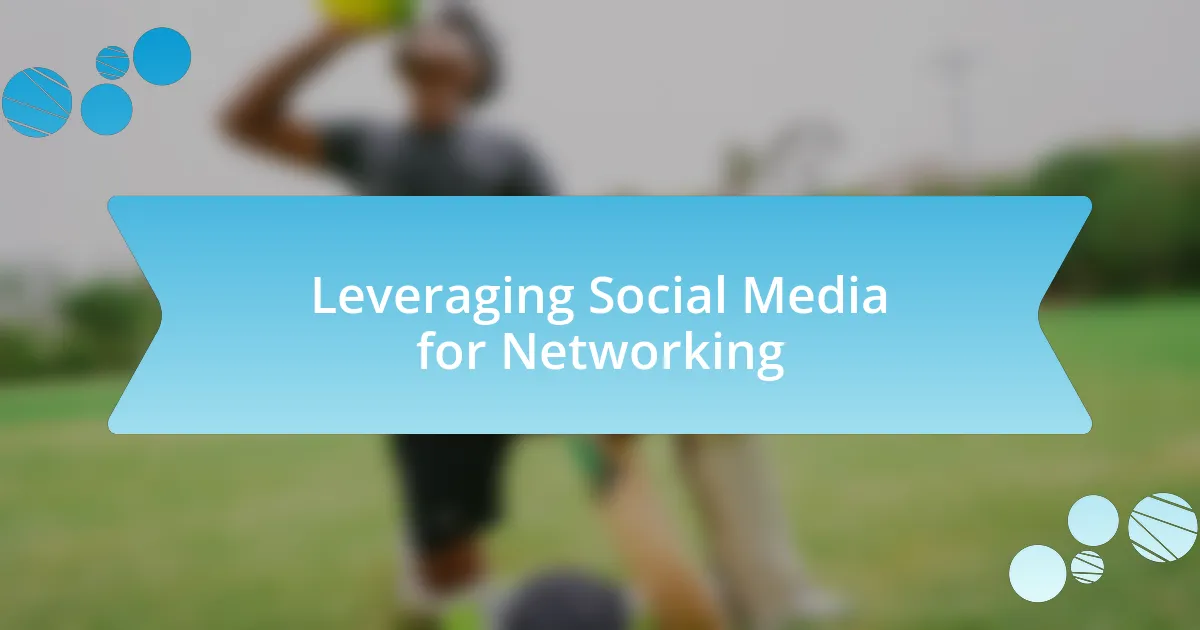
Leveraging Social Media for Networking
Harnessing the power of social media can significantly enhance your networking efforts at tournaments. When I attend events, I make it a point to connect with fellow attendees on platforms like LinkedIn and Twitter. I remember one tournament where I shared a quick post about a panel discussion I found insightful. This not only caught the attention of the speakers but also sparked conversations with other attendees who resonated with my thoughts.
Engagement is key. After I connect with someone on social media, I often engage with their content by liking, commenting, or sharing. For example, I once interacted with a post from a competitor who shared valuable insights about industry trends. This simple act led to an unexpected invitation to guest blog on their site, expanding my reach and visibility. Have you explored how engagement can turn a fleeting connection into a lasting relationship?
It’s pivotal to use hashtags and participate in relevant discussions online. Recently, I jumped into a Twitter chat related to the tournament theme. Sharing my opinions and experiences not only positioned me as an active participant but also attracted potential collaborators. Social media has the potential to elevate your networking game, allowing for genuine connections that extend far beyond the event itself.



